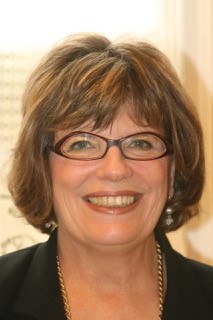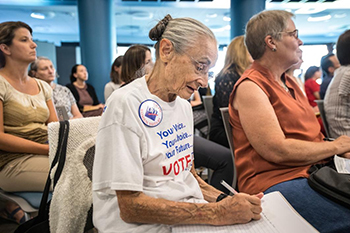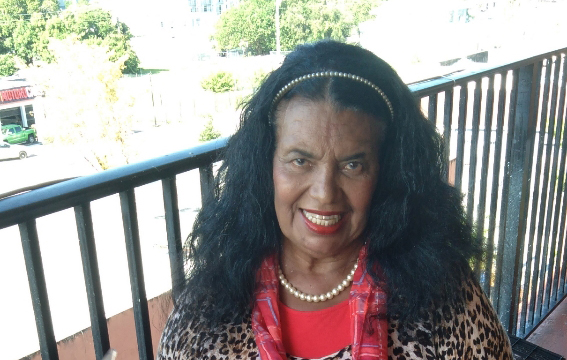As the presidential election heats up and both sides grouse about who they need to get to the polls and how they might make that happen, Generations Today spoke with three older women who are burning up phone lines making personal pleas of new or never before voters to register and show up on Nov. 3. It turns out a lifelong love of voting and all it represents is what it takes to keep advocating, sometimes for 60 years.
The Passionate Pro Voter

Jessica Schreiber, age 72, “still gets misty-eyed about voting,” so she volunteers 15 to 20 hours a week as secretary on the board at Northeast Ohio Voter Advocates (NOVA) in Cleveland, working to increase voter representation of people who are underserved and underrepresented. Previous to the pandemic, NOVA and Schreiber registered people to vote as they were getting food stamps, shopping at food banks, in housing projects and incarcerated at the Cuyahoga County Jail.
“Voting is such a fundamental right,” says Schreiber, “if people are unhappy they need to exercise their franchise, I deeply believe that voting makes a difference. It’s the one way in a democracy that we can have our voices heard and bring about change.”
A California native who is trained as an attorney, Schreiber is also well aware that as a state, Ohio doesn’t have the best record when it comes to fostering that right to vote. Instead she details its efforts to erode the right to vote, including voter ID requirements and other suppression attempts, such as providing one mail-in ballot dropbox in downtown Cleveland—to serve a city of 1.2 million.
Now with COVID-19 NOVA has pivoted to educating people about mailing in their ballots or dropping them off at that one box. “We are reaching our voters through phone banking, and for people in jail we do it remotely,” Schreiber says. She estimates that 40 percent of Ohioans are at high risk of morbidity or mortality if they contract the virus due to age or chronic disease, so she encourages them to forego in-person voting and get their ballots in early.
And NOVA is actively recruiting younger volunteers to serve as poll workers on Nov. 3. When asked how to inspire others to volunteer as she does, Schreiber said, “It’s not that hard. A lot of what I do is from my computer screen. Volunteering makes you feel less isolated, more socially active, and allows you to connect with the community.
“Just find something small to start and you’ll see it’s a mood elevator. You feel like you’re being a participant in the country. Never do I wonder if what I’m doing is worthwhile.
“You’re also helping somebody to feel empowered. To encourage and see immigrants voting for the first time, that’s pretty awesome. And some young men and women who are incarcerated because they can’t afford bail. To see their desire to vote and how appreciative they are is really amazing.”
Bottom line, said Schreiber, “In this election, my husband and I said we’d walk across glass rocks to vote.”
The Lifelong Volunteer

Rivko Knox, age 82, was born and raised in Tujunga, a part of Los Angeles not much talked about, and grew up with a dad who was the neighborhood expert in all things political. All of his friends, which were, like him, Eastern European immigrants, would come to him for advice on voting. He’d tell them he wouldn’t say who to vote for, but he would explain the candidates and their platforms and let them decide for themselves. As a kid she remembers him campaigning for Harry Wallace in 1948, and feeling depressed when he lost to Truman.
Fast forward 18 years and Knox moved to Arizona with her husband and two kids and the first thing she saw was an “Impeach Earl Warren” sign, quickly followed by a John Birch Society bookstore. “I’m in the wrong town!” she says she thought at the time, and set to work finding more like-minded people, first at the ACLU of Arizona and the League of Women Voters and then in the local Democratic Party. And she joined anti-war demonstrations and farmworker rights marches.
Then came a divorce, a Master’s degree in public administration and a pause on her political volunteering as she worked for the State of Arizona. She was active with the ACLU that whole time, however, as they’re nonpartisan.
At age 65 Knox retired from the state, and immediately reengaged, becoming secretary of the Board of the League of Women Voters of Metropolitan Phoenix, then president of the Board of the League and precinct committee president with the Democratic Party. Then, “as I was a League member and knew the positions on a whole lot of issues, I worked my way into being appointed an unpaid registered lobbyist for the League of Women Voters of Arizona,” Knox said.
“I’ve just got to do whatever I can,” Knox says of her multiple advocacy efforts. “Politics is all about moral issues. I think morality is how we treat humans and the earth. Many issues can only be addressed by who gets elected and by being in the streets and pressuring elected officials vs. people to change their minds.
“It is incumbent upon everyone to be aware and act upon what’s happening,” she adds.
Knox sees the primary challenge this year as motivating young voters and voters of color to get out and vote. She’s impressed with efforts in Arizona to create environmental groups like CHiSPA AZ (part of the League of Conservation Voters), which mobilizes Latino communities to get involved in environmental issues. “They are translating environmentalism, which for too many years has been seen as a wealthy person's issue, to how it impacts the average person living in a poor neighborhood, with not enough shade, no solar, no heat or AC.”
Finding rewards in being true to her moral underpinnings, Knox says, “if I’m not doing what I can [to help], I feel quite uncomfortable and guilty and useless and I berate myself for not doing more.”
Although she may not always want to pick up the phone and call potential voters, Knox says, “once I get started I love talking to people and explaining the situation, and sharing information. And sometimes I talk to someone who knows next to nothing and is so glad that someone bothered talking to them and informing them. That is rewarding.”
The Neighborhood Fixer

Juanita Alvarez, age 73, emigrated from Puerto Rico to Florida at age 8 months and has lived in Miami ever since, excepting a 17-year break in Rochester, NY. She grew up in the racially diverse neighborhood of Liberty City, served 25 years in the U.S. Army as a nurse and military policy officer, then moved to Rochester when her son and daughter made the same move. In Rochester she became involved with a civil rights organization. When she returned to Miami, she decided to stay involved, this time in get-out-the-vote efforts.
“It’s so important,” Alvarez says, “for people to go out and vote because if not it will be even worse than what’s going on right now. How people are struggling, and continuing to live through 2020 and the COVID-19 pandemic—it’s terrible.”
Alvarez volunteers on the phone bank for six hours a day, five days a week at the New Florida Majority (NFM), and explains that her title is “volunteer with pay, as we do get paid!”
Alvarez says the greatest need right now is helping people to vote. The NFM sends register-to-vote links to potential voters by phone, but as many people Alvarez connects with don’t know to use a link, “I have to find a way to help them do that. Either I go to their home (outside), if they live close by and help them out. Or if can send an application by mail or take it to them and get it into their hands, I do so.
“We give people a voice, when they are lonely in their house, when they don’t have family, when they have nothing and are sick. When I hear their voice, I try to be as sweet as possible,” she says.
In Allapattah (or Little Havana), where Alvarez lives, she’s also known, unofficially, as a lawyer, a nurse, a police officer, the one to call when you need to apply for Section 8 housing or if you need a new driver’s license.
“These are people who call me, even for immigration issues,” she says. “Because here, in Little Havana, so many people need so much help. Before COVID I helped the people who were homeless in the street. They get a check from Social Security for $720, but rent is $800. And many don’t have health plans. I have Medicaid, and Medicare, and the military insurance. But these people have nothing. Lots of people have lost jobs, and I have written down how many who have died.
“Sometimes I don’t know how much more my heart can take,” Alvarez says.
She does know that she would do almost anything to get people to vote in this election. “I’d go and pick them up, or one of my sons would, if I can’t take them, just make sure they’d go with a family member or someone else. Or get on the phone and tell them to vote.” and, she says, “Don’t take no for an answer.”
Alison Biggar is ASA's Editorial Director.









